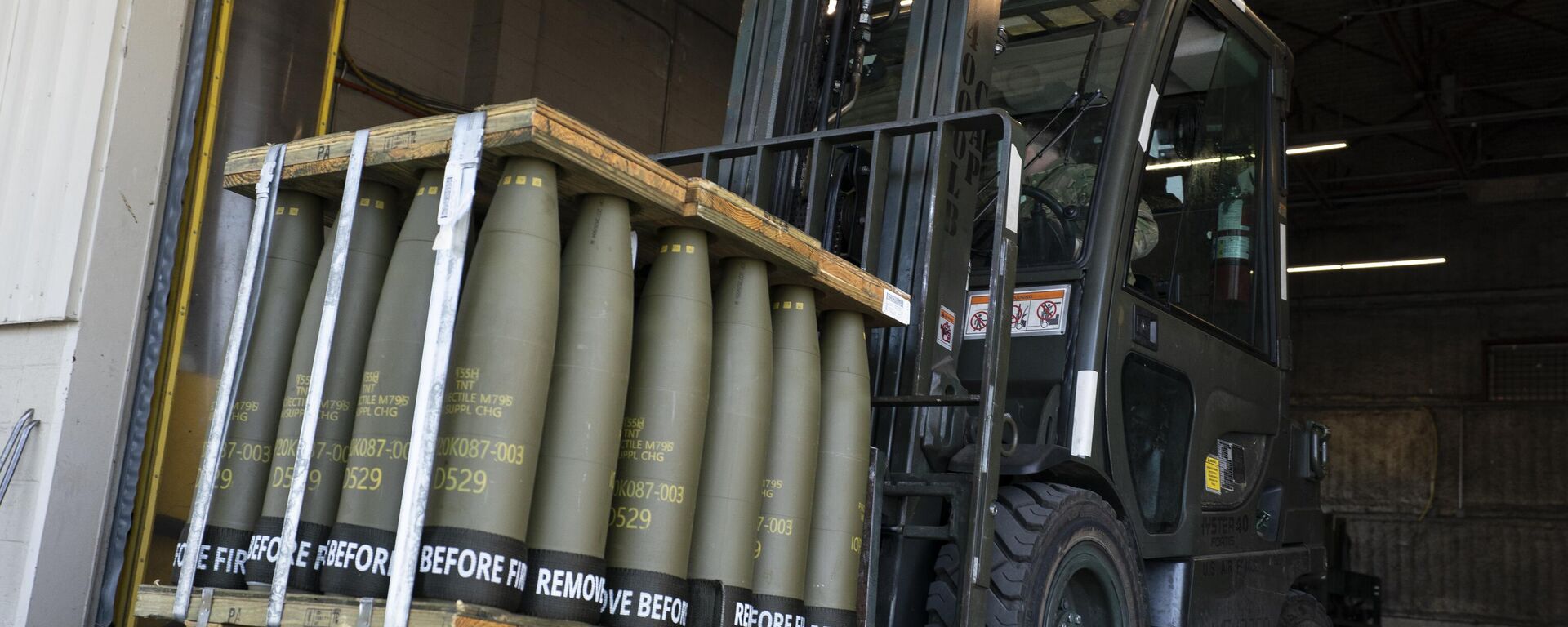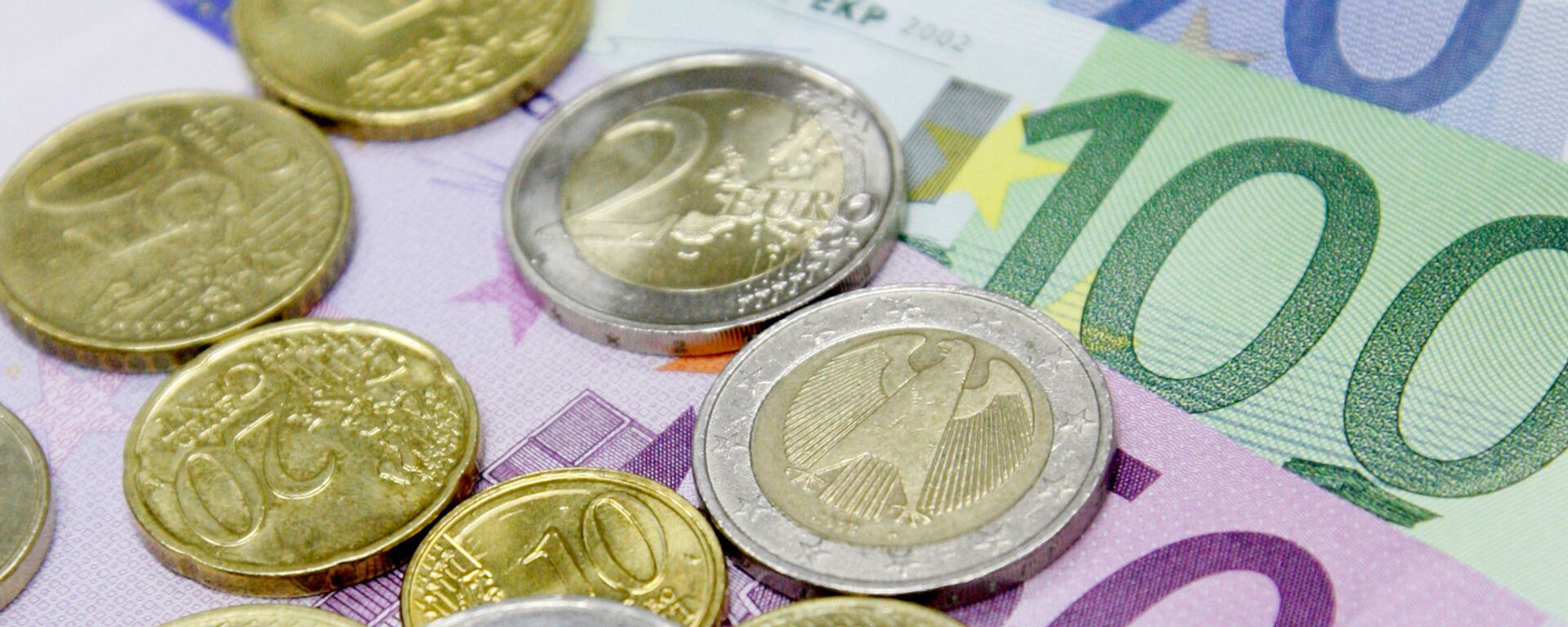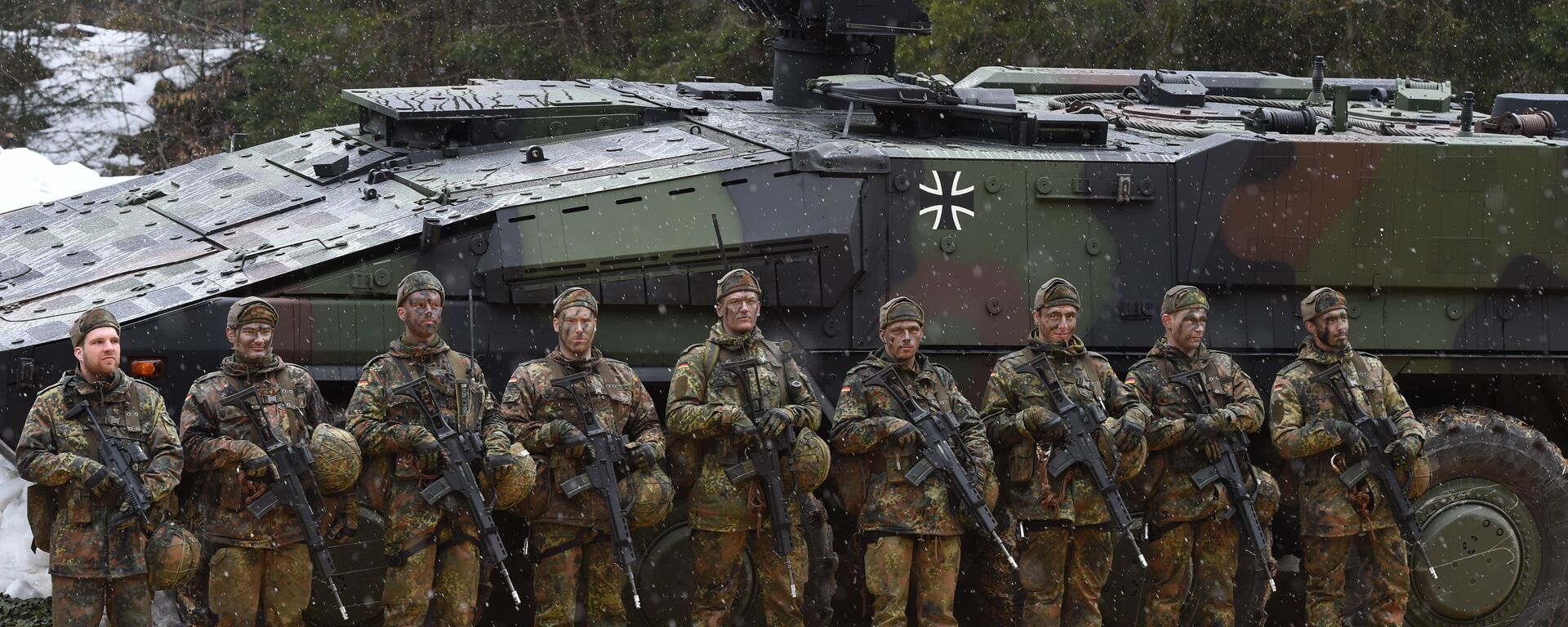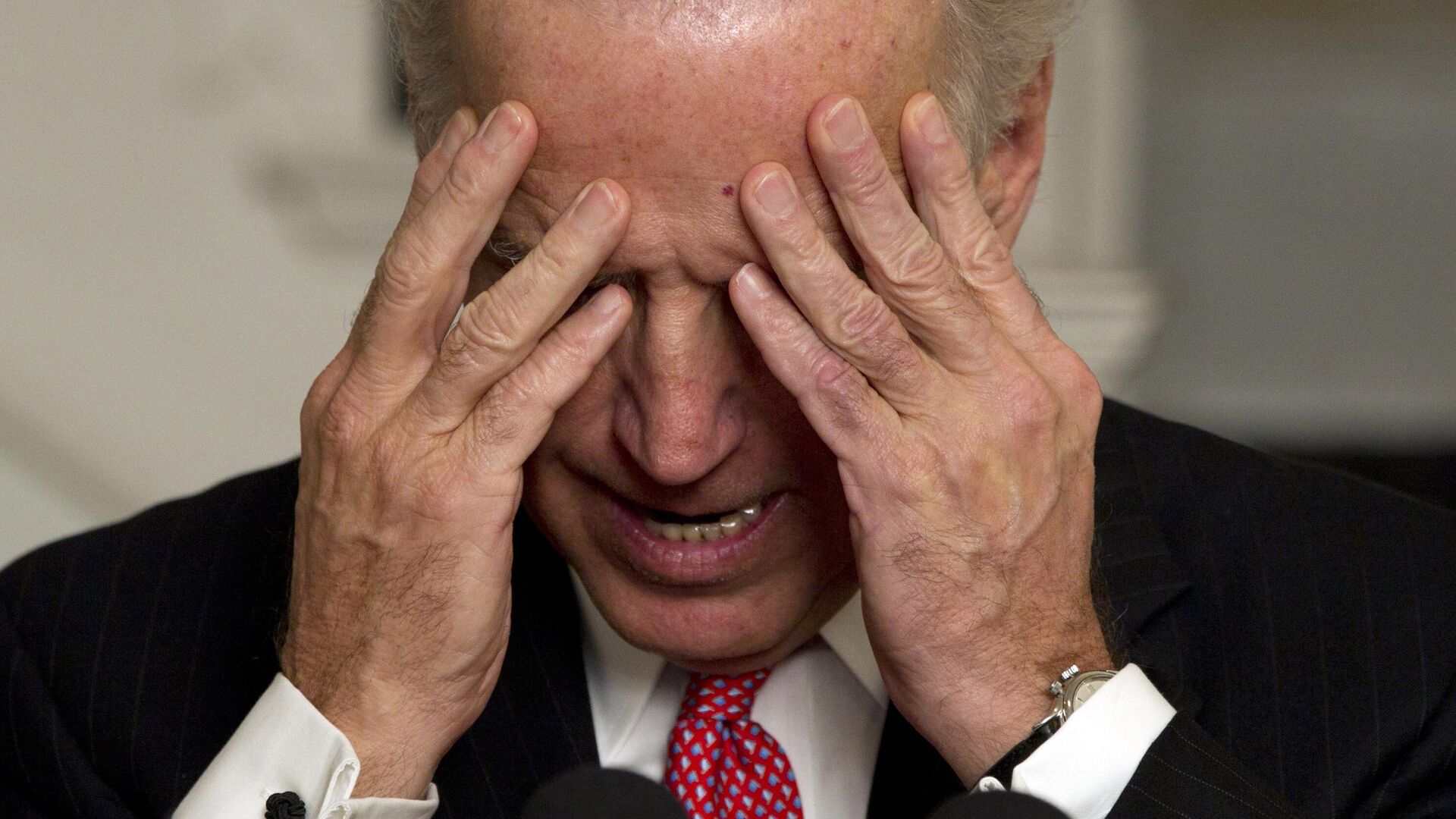https://sputnikglobe.com/20240208/ukraine-support-collapsing-what-are-bidens-options-to-fund-kiev-1116669518.html
Ukraine Support Collapsing: What are Biden's Options to Fund Kiev?
Ukraine Support Collapsing: What are Biden's Options to Fund Kiev?
Sputnik International
Senate Republicans blocked a bipartisan border security and foreign aid bill that was tied to the $60-billion Ukraine aid package. Will the Biden government be... 08.02.2024, Sputnik International
2024-02-08T16:22+0000
2024-02-08T16:22+0000
2024-02-08T18:54+0000
ukraine
world
joe biden
chuck schumer
russia
germany
european union (eu)
senate
republicans
nord stream
https://cdn1.img.sputnikglobe.com/img/07e8/02/05/1116610763_0:218:2974:1891_1920x0_80_0_0_9da7cb5620affb338d76bb372eec78ac.jpg
The Ukraine aid package is in limbo after Senate Republicans rejected the bipartisan $118-billion "compromise" bill after months of negotiations.The Associated Press reported that Democrat Senate Majority Leader Chuck Schumer tried to initiate a test vote on a $95-billion package for Ukraine, Israel and other US allies – a modified version of the legislation stripped of the border funding. By a final tally 67-32 the upper chamber voted to begin debate on a $95 billion bill. Senators will debate the legislation just a few days before their two-week recess and just a few weeks until government shutdown deadlines. The US media says the bill faces "an uphill battle."The news agency stressed that further military aid to Ukraine was the bill's top priority for Schumer and Republican Senate Leader Mitch McConnell, and lamented the fact that McConnell's control over his party caucus was "slipping."Even if the compromise legislation managed to pass through the upper chamber it would likely be axed in the House. Immediately after the bill's publication, Republican House Speaker Mike Johnson warned that it would be "dead on arrival", while Johnson's party-mates said that it would not even make it to a vote.Meanwhile, the White House has no way to make up for losing the $60 billion it demanded to prolong the Ukrainian military effort, the New York Times acknowledged, even though National Security Adviser Jake Sullivan argued that the bill is not dead yet.Where to Take Money From?According to the newspaper, behind-the-scenes discussions continue on where to take money from. The US leadership's first option is to appropriate Russian Central Bank assets, evaluated at $300 billion, that have been frozen since February 2022. But hat remains a long shot, media pundits admit.As Jacques Sapir, director of studies at the School for Advanced Studies in the Social Sciences (EHESS) in Paris, told Sputnik in October, any attempt by the West to grab Russia's frozen assets or revenues from them could turn into a legal nightmare for the Western leadership and would only dissuade other countries from storing their assets in Western banks.Even if Washington somehow manages to grab the Russian assets, it might still require congressional action to redirect the funds to fund air defense systems and artillery for Ukraine. Meanwhile, House Republicans seem unwilling to shift focus to overseas wars from the US border crisis.The second option under consideration is complicated weapons swaps, similar to those between South Korea, Japan and the US. Both Asian countries refused to provide artillery shells directly to Ukraine, but agreed to supply the munitions to the US which re-exported them.The third option, according to the newspaper, is to make European nations pay for American weapons and send those to Ukraine.With the EU suffering an economic slump and soaring inflation which prompted it to cut benefits and agricultural subsidies, massive farmer protests have engulfed the bloc, forcing some member states to backpedal on the most radical austerity measures. Under these circumstances it is unclear how EU governments would justify funnelling money into the black hole of the Ukraine conflict, especially at the time when Euro-sceptic and right-wing parties are riding high in opinion polls prior to the European Parliament elections.Could US Make Offer EU Can't Refuse Amid Scholz Visit?The EU "clearly doesn't have the capacity to provide much more ammunition by itself," noted the NYT, pointing out that after the end of the Cold War Europe dismantled much of its production capacity. Now the EU is struggling to deliver on its promise to send one million artillery shells to Ukraine by March. According to Reuters, the bloc will only be able to supply half of what it pledged.Meanwhile, German Chancellor Olaf Scholz is due to meet US President Joe Biden on February 9 in Washington DC. The NYT said the discussions may include Germany's role in supplying Ukraine with weapons, including long-range air-launched Taurus missiles — something which Berlin has so far refused to do.Until recently Germany had been the EU's industrial powerhouse. But since Berlin joined the US-led energy sanctions against Russia and the sabotage of the Nord Stream pipelines delivering cheap gas to Europe, the German industrial sector has been in steady decline. Some German industries have relocated from the country over energy uncertainty and high production prices.Pulitzer Prize-winning journalist Seymour Hersh's claim that Washington was behind the Nord Stream bombing indicates that the Biden administration may have shot itself in the foot by weakening Germany.The country can now barely replenish its own weapons stockpiles, let alone produce new arms for the Kiev regime, as Gunnar Beck, Member of the European Parliament for the Alternative for Germany (AfD) party who is currently Vice-President of the Identity & Democracy Group in the Parliament, told Sputnik in late January.The US-championed sanctions slapped on almost all sectors of the Russian economy have backfired on Europe, undermining its energy security, supply chains and logistics. A weakened Europe seems incapable of bearing the heavy burden of the Ukraine conflict, leaving Biden on the horns of a dilemma.
https://sputnikglobe.com/20240206/solving-ukraines-munition-needs-wont-bring-us-any-closer-to-winning-proxy-war-1116628209.html
https://sputnikglobe.com/20240205/burden-of-ukraine-funding-may-be-passed-onto-europe-1116606550.html
https://sputnikglobe.com/20240123/germany-cant-afford-rearmament-let-alone-a-war-with-russia-1116337756.html
https://sputnikglobe.com/20230824/whats-behind-decline-of-germany-1112852729.html
https://sputnikglobe.com/20240207/hersh-wests-hesitance-to-conclude-nord-stream-probe-implicates-culprits-1116642115.html
ukraine
russia
germany
Sputnik International
feedback@sputniknews.com
+74956456601
MIA „Rossiya Segodnya“
2024
News
en_EN
Sputnik International
feedback@sputniknews.com
+74956456601
MIA „Rossiya Segodnya“
Sputnik International
feedback@sputniknews.com
+74956456601
MIA „Rossiya Segodnya“
ukraine, joe biden, chuck schumer, russia, germany, european union (eu), senate, republicans, nord stream, alternative fuer deutschland (afd), us, europe
ukraine, joe biden, chuck schumer, russia, germany, european union (eu), senate, republicans, nord stream, alternative fuer deutschland (afd), us, europe
Ukraine Support Collapsing: What are Biden's Options to Fund Kiev?
16:22 GMT 08.02.2024 (Updated: 18:54 GMT 08.02.2024) Senate Republicans blocked a bipartisan border security and foreign aid bill that was tied to the $60-billion Ukraine aid package. Will the Biden government be able to keep funding the bloodshed in Ukraine?
The Ukraine aid package is in limbo after Senate Republicans rejected the bipartisan $118-billion "compromise" bill after months of negotiations.
The Associated Press reported that Democrat Senate Majority Leader Chuck Schumer tried to initiate a test vote on a $95-billion package for Ukraine, Israel and other US allies – a modified version of the legislation stripped of the border funding. By a final tally 67-32 the upper chamber voted to begin debate on a $95 billion bill. Senators will debate the legislation just a few days before their two-week recess and just a few weeks until government shutdown deadlines. The US media says the bill faces "an uphill battle."
The news agency stressed that further military aid to Ukraine was the bill's top priority for Schumer and Republican Senate Leader Mitch McConnell, and lamented the fact that McConnell's control over his party caucus was "slipping."
Even if the compromise legislation managed to pass through the upper chamber it would likely be axed in the House. Immediately after the bill's publication, Republican House Speaker Mike Johnson warned that it would be "dead on arrival", while Johnson's party-mates said that it would not even make it to a vote.
Meanwhile, the White House has no way to make up for losing the $60 billion it demanded to prolong the Ukrainian military effort, the New York Times acknowledged, even though National Security Adviser Jake Sullivan argued that the bill is not dead yet.
"We're not focused on Plan B. We're focused on Plan A," Sullivan told reporters on Wednesday after a NATO meeting in Brussels.

6 February 2024, 18:55 GMT
Where to Take Money From?
According to the newspaper, behind-the-scenes discussions continue on where to take money from. The US leadership's first option is to appropriate Russian Central Bank assets, evaluated at $300 billion, that have been frozen since February 2022. But hat remains a long shot, media pundits admit.
As Jacques Sapir, director of studies at the School for Advanced Studies in the Social Sciences (EHESS) in Paris,
told Sputnik in October, any attempt by the West to grab Russia's frozen assets or revenues from them could turn into a legal nightmare for the Western leadership and would only dissuade other countries from storing their assets in Western banks.
Even if Washington somehow manages to grab the Russian assets, it might still require congressional action to redirect the funds to fund air defense systems and artillery for Ukraine. Meanwhile, House Republicans seem unwilling to shift focus to overseas wars from the US border crisis.

5 February 2024, 18:59 GMT
The second option under consideration is complicated weapons swaps, similar to those between South Korea, Japan and the US. Both Asian countries refused to provide artillery shells directly to Ukraine, but agreed to supply the munitions to the US which re-exported them.
The
third option, according to the newspaper, is
to make European nations pay for American weapons and send those to Ukraine.
The European Union has recently approved of a $54-billion package for the Ukrainian government after Hungary agreed not to veto the initiative — on the basis that the money would be mostly spent on supporting Ukraine's collapsing economy. But it is unclear whether Hungarian Prime Minister Viktor Orban would succumb to Brussels' pressure to pay for US arms for the Kiev regime.
With the EU suffering an economic slump and soaring inflation which prompted it to cut benefits and agricultural subsidies, massive farmer protests have engulfed the bloc, forcing some member states to backpedal on the most radical austerity measures.
Under these circumstances it is unclear how EU governments would justify funnelling money into the black hole of the Ukraine conflict, especially at the time when Euro-sceptic and right-wing parties are riding high in opinion polls prior to the European Parliament elections.

23 January 2024, 18:07 GMT
Could US Make Offer EU Can't Refuse Amid Scholz Visit?
The EU "clearly doesn't have the capacity to provide much more ammunition by itself," noted the NYT, pointing out that after the end of the Cold War Europe dismantled much of its production capacity. Now the EU is struggling to deliver on its promise to send one million artillery shells to Ukraine by March. According to Reuters, the bloc will only be able to supply half of what it pledged.
Meanwhile, German Chancellor Olaf Scholz is due to meet US President Joe Biden on February 9 in Washington DC. The NYT said the discussions may include Germany's role in supplying Ukraine with weapons, including long-range air-launched Taurus missiles — something which Berlin has so far refused to do.

24 August 2023, 14:02 GMT
Until recently Germany had been the EU's industrial powerhouse. But since Berlin joined the US-led energy sanctions against Russia and the sabotage of the Nord Stream pipelines delivering cheap gas to Europe, the German industrial sector has been in steady decline. Some German industries have relocated from the country over energy uncertainty and high production prices.
Pulitzer Prize-winning journalist Seymour Hersh's claim that
Washington was behind the Nord Stream bombing indicates that the Biden administration may have shot itself in the foot by weakening Germany.
The country can now barely replenish its own weapons stockpiles, let alone produce new arms for the Kiev regime, as Gunnar Beck, Member of the European Parliament for the Alternative for Germany (AfD) party who is currently Vice-President of the Identity & Democracy Group in the Parliament,
told Sputnik in late January.
The US-championed sanctions slapped on almost all sectors of the Russian economy have backfired on Europe, undermining its energy security, supply chains and logistics. A weakened Europe seems incapable of bearing the heavy burden of the Ukraine conflict, leaving Biden on the horns of a dilemma.

7 February 2024, 13:53 GMT







